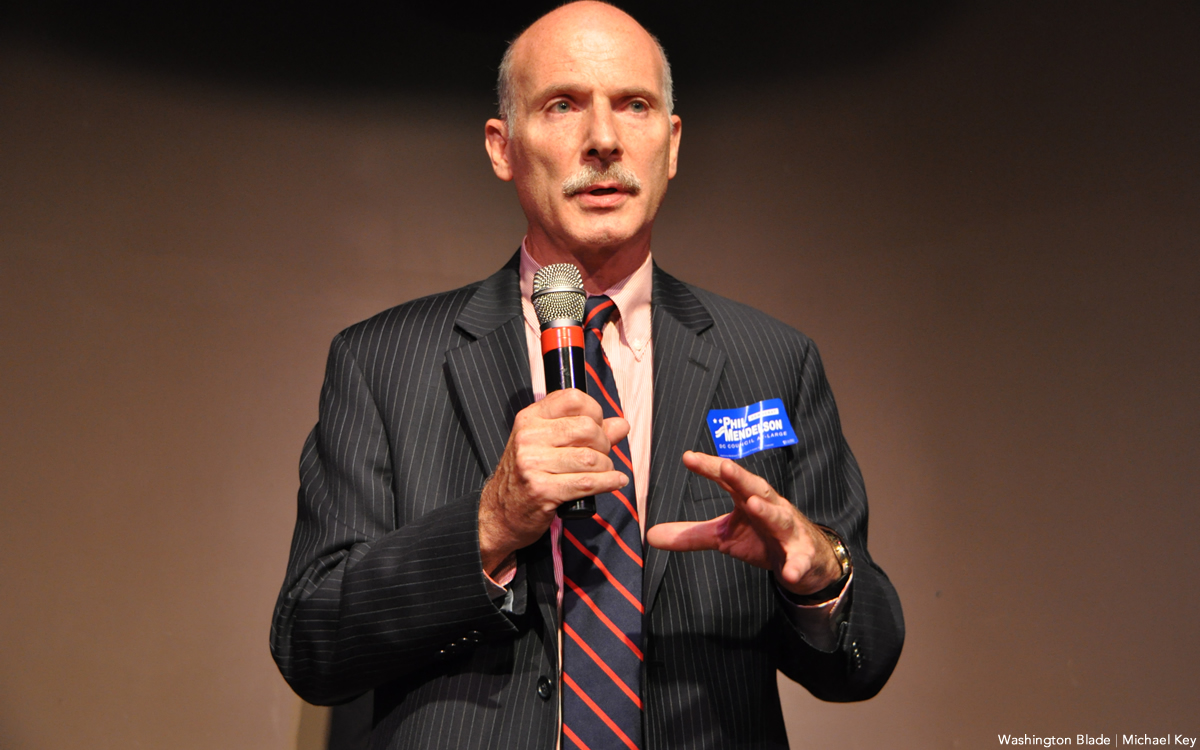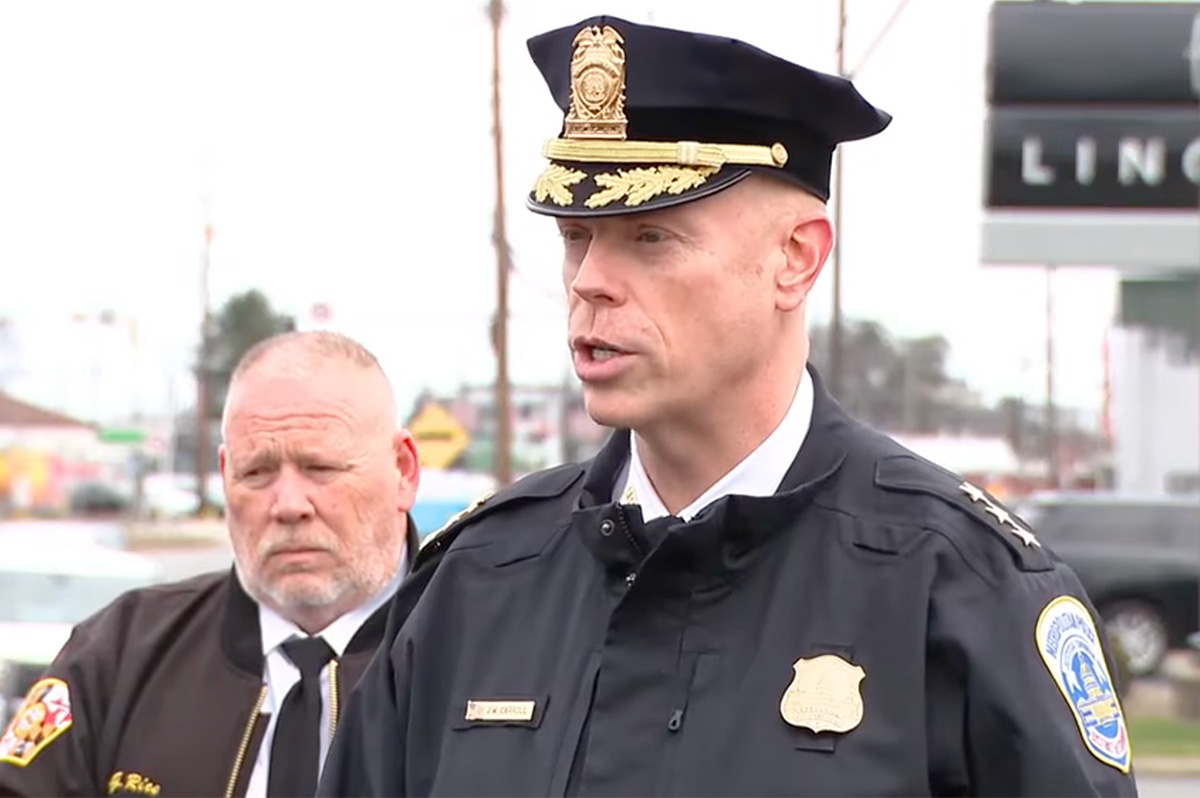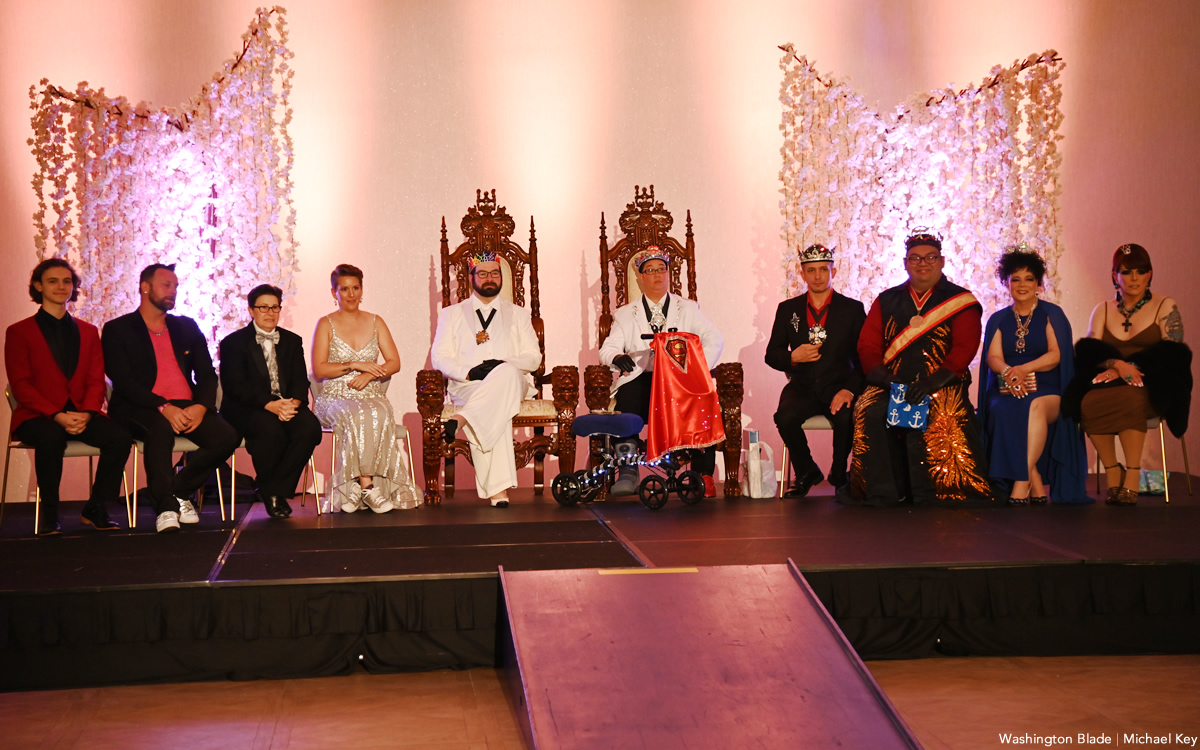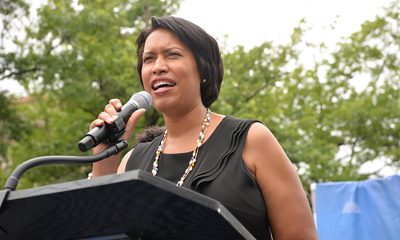District of Columbia
Capital Stonewall Democrats holds D.C. Council chair, at-large Council candidates forum
Mendelson, Bonds join opponents in discussing LGBTQ forum

The Capital Stonewall Democrats, D.C.’s largest local LGBTQ political group, hosted the fifth and last of its series of LGBTQ candidate forums on May 11 by hosting candidates running for D.C. Council Chair and At-Large D.C. Council in the city’s June 21 Democratic primary.
Similar to the earlier forums, each of the candidates, including incumbent Council Chair Phil Mendelson and incumbent at-large Councilmember Anita Bonds, expressed strong support for LGBTQ rights and cited their records in office or their work in the community on various issues related to LGBTQ programs or projects.
Among those participating in the virtual forum broadcast via Zoom was ethics attorney and Advisory Neighborhood Commissioner Erin Palmer, who is challenging Mendelson for the Council Chair position.
The candidates challenging Bonds for the at-large Council seat included Lisa Gore, Ward 3 Advisory Neighborhood Commissioner and former housing fraud investigator for the U.S. Department of Housing and Urban Development; Nate Fleming, former D.C. shadow U.S. House member and former D.C. Council staffer; and Dexter Williams, former Howard University government relations official, former D.C. Council staffer, and current election systems consultant.
Local community activists and small business owners Heidi Ellis and George Kerr, who served as co-moderators of the forum, asked the candidates questions on a wide range of topics, including the city’s efforts to curtail anti-LGBTQ hate crimes, city funding for local LGBTQ organizations that provide services for LGBTQ people in need and problems faced by LGBTQ elders.
Other questions touched on the topics of racial and economic justice, whether the candidates or incumbents have LGBTQ people on their Council or campaign staff; whether term limits should be put in place for members of the Council, and whether D.C. police and the Office of the federally controlled U.S. Attorney for D.C. were doing enough to address anti-LGBTQ violence.
Capital Stonewall Democrats President Jatarious Frazier stated at the forum that electronic voting had begun for members of the organization to decide on which candidates to endorse and that an announcement of the winners of the group’s endorsements would be made on or shortly before May 17. Frazier said that under the organization’s rules, a 60 percent majority vote for a candidate was needed for an endorsement to be given.
A full video recording of the May 11 forum can be accessed here:
https://www.facebook.com/StonewallDems51/
A Washington Blade transcript of the candidates’ opening statements at the May 11 forum can be viewed below.
D.C. COUNCIL CHAIR RACE
Opening Statements
Phil Mendelson
Thank you, Capital Stonewall Democrats for doing this once again. Although I have to say this is the first time in my many years that this has been virtual. So, it’s a different experience. But I very much welcome this opportunity. For those of you who don’t know me, I was an ANC commissioner for 20 years before I was elected to the Council. I have been chair of the Council for the past 10 years.
I have an adopted daughter who graduated from the D.C. public schools with a major in art, which she is pursuing as her career. As an incumbent, I have a record, not just promises. And I am proud of my record. And my record has been very strong in the area with regard to issues that are important to the LGBTQ community.
Although it was a few years ago, when I chaired the Committee on the Judiciary, I got through the Council our legislation to make the District the sixth jurisdiction in the country to recognize marriage equality. And I got it through with a strategy that ensured that Congress wasn’t going to override what we did. As you know, they tried to do it many other times.
I have a very strong progressive record when it comes to these issues. When I chaired the Judiciary, I had hearings frequently with regard to hate crimes and enforcement against hate crimes. Most recently I introduced legislation to prohibit the gay panic defense in the District so that would not be used or misused with regard to hate crimes. As I said it’s not enough to just say one has progressive values or to put forth campaign promises but actually to see how I delivered over and over again on issues, like universal paid leave, where I not only rewrote the law but got it through the Council over the opposition of the mayor. And other issues as well. I guess my time is up. But I look forward to the questions and ask for your support.
Erin Palmer
Thank you so much. Thank you to the Capital Stonewall Democrats. My name is Erin Palmer. I use she/her pronouns. And I’m running for D.C. Council chairwoman. And a little bit about myself–I’m a mom to three children who are 11, nine and seven. They are very much a part of my civic and political life. And if you know me, you’ll get to know them as well. I fondly refer to them as the monsters because they’re chaotic.
My profession—I’m in ethics … most recently having worked on judicial ethics and institutional accountability for the federal judiciary. And I’m also an Advisory Neighborhood Commissioner in Ward 4, where I have worked across commissions with commissioners citywide on systemic issues, including being an ally to the ANC Rainbow Caucus on some of the issues that they have worked on.
I’m running to bring energy, vision and compassion to D.C.’s challenges. And I think it is particularly important in light of the current national context. As we’ve seen, there was a recent release of a draft Supreme Court decision overturning Row v. Wade. And this is a reminder that we have to be constantly vigilant. We have to not take our rights and protections for granted. And we need to be dedicated at the local level to working very intentionally to support our communities with the most aid.
I bring a dedication to ethics in government and accountability. I’m the only Fair Elections candidate in this race, which means that I am rejecting corporate donations. And I’m accountable to and engaged with D.C. residents. I’m also the only candidate in this race with a D.C. Council accountability plan for a more modern ethical and accountable D.C. Council that ties specifically to the role of the chair in setting the procedures and governance structure for the Council.
I believe strongly in meeting basic needs as rights as a values-driven proposition. Things like housing, education and healthcare that lead with those values impacts how we budget, how we legislate, how we do oversight. And that doing those things keeps our community safe and strong. And I will lead with those values every day. Thank you so much.
AT-LARGE D.C. COUNCIL RACES
Anita Bonds
Well good evening, everyone. My name, of course, is Anita Bonds. And I am your at-large Council member on the D.C. Council. It is a pleasure to join with you this evening and to talk about our city that I have built my career on making sure that we, all of us, have an opportunity to continue to live here. It is vital that we hold ourselves and one another accountable for ensuring that we are allies, not only visibly but materialistically each and every day.
As an ally to the LGBTQ community, I have maintained a legislative agenda that consists of priorities demonstrated in my votes on legislation and in the budget that ensures the rights, protections and the livelihood of members of the LGBTQ community. While we work to achieve true equality and make sure that voices of the LGBTQ community are heard, especially considering the history of the violence that this community has endured for a number of years.
I made it a priority to include members of the LGBTQ community when making my appointments to the Police Reform Commission as an example. And I also have representation from the LGBTQ community on my staff, in fact, from the day when taking my seat on the Council. The senior LGBTQ community that has been historically neglected by society is one that always is dear to my heart. And I have spent a lot of energy trying to make things right. And I have also co-introduced and voted for care for LGBTQ seniors and—I ran out of time. Thank you.
Lisa Gore
Good evening, everyone, and thank you Capital Stonewall Democrats for hosting this important forum. I’m glad to be here tonight to discuss a little bit about myself and my campaign. And my name is Lisa Gore. I’m a D.C. public school mom. I am a current sitting ANC commissioner In ANC 34G serving both Ward 3 and Ward 4. And I recently retired as a federal investigator from the IG’s office from HUD, where I spent over 25 years investigating housing fraud and conducting oversight of a national housing program.
My campaign is basically centered around marginalized communities. And our campaign is centered around making D.C. a more just D.C. That’s everything from education, housing, environmental justice, aging and health, senior platform issues, and especially issues that are common in the LGBTQ community. I’m proud that I recently got the highest at-large rating with the GLAA endorsement of 8.5. And I think that really demonstrates the strength of our policy platform in this area.
There’s several members of my campaign team paid and unpaid that are members of the LGBTQ community. And you might know me as a candidate that has rainbow signs out there, all across D.C. So, this community has been in my heart from day one and the day I started this campaign designing my yard signs. I wanted to make sure that D.C. knows that I’m representative of this community. So, thank you. I’m looking forward to hearing the issues and talking to you tonight about my platform.
Nate Fleming
Good evening, everyone. My name is Nate Fleming. I’m running for D.C. Council at-large. And I’m not here to pander to you. I’m here to speak to you about the issues impacting the LGBT community. I’m a member of this club. I’ve been a longtime member of this club since 2010. A little bit about me—I grew up in this city. Single mother household in the middle of the crack epidemic.
But education is what took me to Morehouse College. I was able to become a lawyer. I studied at Berkeley Law. I got a full scholarship to Harvard Kennedy School. And I believe that when you get opportunities like that coming from my background, you have a responsibility to try to create opportunities for others. And that’s really what I worked to do. First, coming back to D.C. serving as D.C. shadow representative.
The first political endorsement I ever received was from the Gertrude Stein Democratic Club, the former name of the Capital Stonewall Democrats. I’ve been endorsed in every campaign that I’ve run. And in this race in 2014 I received more votes than any other candidate from the Capital Stonewall Democrats. That’s because this club has done so much work in the fight for equal rights, justice and fairness, particularly the fight in 2010 for marriage equality, where I stood directly with members of this club to fight for those rights with the Council.
And I believe these issues, these values that this club represents needs to extend and permeate throughout the city. Because the pandemic has exacerbated the issues that are important to the LGBT community, whether that’s housing, whether that’s job and employment, whether that’s healthcare. And we need more than ever bold, creative and thoughtful leadership that’s going to help us build back better and reverse these systems so they can work for everyday people.
So, that’s what I’m looking forward to doing. There’s some great programs that are out there like the transgender and gender nonconforming workforce program. Thirty percent of LGBT youth identify as homeless. We have to expand LGBTQ centered health care, mental health care specifically in this city. And I’m looking forward to implementing the HIV long term bill of rights. Those are the type of issues I’m going to work on as your next at-large Council member.
Dexter Williams
Thank you and good evening. My name is Dexter Williams. I’m running for at-large Council member. And I want to thank the Capital Stonewall Democrats for sponsoring tonight’s forum. As a candidate, I am very committed to the LGBTQ community, just as I am for all marginalized people across the city. What I want you to know is that this forum is no different for me because I am very sensitive to the inequities and struggles that are faced by many in the LGBTQ community, whether it is discrimination, crime and even murder impacting the trans community, double marginalization of race unemployment faced by the Black, Latino [inaudible] communities or the possible threats to marriage equality depending on just how far the Supreme Court and states will go in the future.
As a candidate, I am running on a theme of change. While D.C. is viewed as gay friendly, I know that housing discrimination, ageism, employment barriers and even in the [inaudible] issues still persist. Whether subtle discrimination such as the recent statement by Vincent Orange referring to Zach Parker as a candidate for Ward 5 Council member, who recently came out as gay, followed by Vincent Orange’s equally weak apology for his egregious—for his weak apology or the more egregious trans murders that took place last year.
No one should be made to feel less for being their true selves. I know we are [inaudible] in the city, but we can and should do better in housing, places of employment. We should do better and I’m going to make sure that we do. Thank you.
District of Columbia
Kennedy Center renaming triggers backlash
Artists who cancel shows threatened; calls for funding boycott grow

Efforts to rename the Kennedy Center to add President Trump’s name to the D.C. arts institution continue to spark backlash.
A new petition from Qommittee , a national network of drag artists and allies led by survivors of hate crimes, calls on Kennedy Center donors to suspend funding to the center until “artistic independence is restored, and to redirect support to banned or censored artists.”
“While Trump won’t back down, the donors who contribute nearly $100 million annually to the Kennedy Center can afford to take a stand,” the petition reads. “Money talks. When donors fund censorship, they don’t just harm one institution – they tell marginalized communities their stories don’t deserve to be told.”
The petition can be found here.
Meanwhile, a decision by several prominent musicians and jazz performers to cancel their shows at the recently renamed Trump-Kennedy Center in D.C. planned for Christmas Eve and New Year’s Eve has drawn the ire of the Center’s president, Richard Grenell.
Grenell, a gay supporter of President Donald Trump who served as U.S. ambassador to Germany during Trump’s first term as president, was named Kennedy Center president last year by its board of directors that had been appointed by Trump.
Last month the board voted to change the official name of the center from the John F. Kennedy Memorial Center For The Performing Arts to the Donald J. Trump And The John F. Kennedy Memorial Center For The Performing Arts. The revised name has been installed on the outside wall of the center’s building but is not official because any name change would require congressional action.
According to a report by the New York Times, Grenell informed jazz musician Chuck Redd, who cancelled a 2025 Christmas Eve concert that he has hosted at the Kennedy Center for nearly 20 years in response to the name change, that Grenell planned to arrange for the center to file a lawsuit against him for the cancellation.
“Your decision to withdraw at the last moment — explicitly in response to the Center’s recent renaming, which honors President Trump’s extraordinary efforts to save this national treasure — is classic intolerance and very costly to a non-profit arts institution,” the Times quoted Grenell as saying in a letter to Redd.
“This is your official notice that we will seek $1 million in damages from you for this political stunt,” the Times quoted Grenell’s letter as saying.
A spokesperson for the Trump-Kennedy Center did not immediately respond to an inquiry from the Washington Blade asking if the center still planned to file that lawsuit and whether it planned to file suits against some of the other musicians who recently cancelled their performances following the name change.
In a follow-up story published on Dec. 29, the New York Times reported that a prominent jazz ensemble and a New York dance company had canceled performances scheduled to take place on New Year’s Eve at the Kennedy Center.
The Times reported the jazz ensemble called The Cookers did not give a reason for the cancellation in a statement it released, but its drummer, Billy Hart, told the Times the center’s name change “evidently” played a role in the decision to cancel the performance.
Grenell released a statement on Dec. 29 calling these and other performers who cancelled their shows “far left political activists” who he said had been booked by the Kennedy Center’s previous leadership.
“Boycotting the arts to show you support the arts is a form of derangement syndrome,” the Times quoted him as saying in his statement.
District of Columbia
New interim D.C. police chief played lead role in security for WorldPride
Capital Pride says Jeffery Carroll had ‘good working relationship’ with organizers

Jeffery Carroll, who was named by D.C. Mayor Muriel Bowser on Dec. 17 as the city’s Interim Chief of Police, played a lead role in working with local LGBTQ community leaders in addressing public safety issues related to WorldPride 2025, which took place in D.C. last May and June
“We had a good working relationship with him, and he did his job in relation to how best the events would go around safety and security,” said Ryan Bos, executive director of Capital Pride Alliance.
Bos said Carroll has met with Capital Pride officials in past years to address security issues related to the city’s annual Capital Pride parade and festival and has been supportive of those events.
At the time Bowser named him Interim Chief, Carroll had been serving since 2023 as Executive Assistant Chief of Specialized Operations, overseeing the day-to-day operation of four of the department’s bureaus. He first joined the D.C. Metropolitan Police Department in 2002 and advanced to multiple leadership positions across various divisions and bureaus, according to a statement released by the mayor’s office.
“I know Chief Carroll is the right person to build on the momentum of the past two years so that we can continue driving down crime across the city,” Bowser said in a statement released on the day she announced his appointment as Interim Chief.
“He has led through some of our city’s most significant public safety challenges of the past decade, he is familiar with D.C. residents and well respected and trusted by members of the Metropolitan Police Department as well as our federal and regional public safety partners,” Bowser said.
“We have the best police department in the nation, and I am confident that Chief Carroll will meet this moment for the department and the city,” Bowser added.
But Bowser has so far declined to say if she plans to nominate Carroll to become the permanent police chief, which requires the approval of the D.C. City Council. Bowser, who announced she is not running for re-election, will remain in office as mayor until January 2027.
Carroll is replacing outgoing Chief Pamela Smith, who announced she was resigning after two years of service as chief to spend more time with her family. She has been credited with overseeing the department at a time when violent crime and homicides declined to an eight-year low.
She has also expressed support for the LGBTQ community and joined LGBTQ officers in marching in the WorldPride parade last year.
But Smith has also come under criticism by members of Congress, who have accused the department of manipulating crime data allegedly showing lower reported crime numbers than actually occurred. The allegations came from the Republican-controlled U.S. House Oversight Committee and the U.S. Justice Department
Bowser has questioned the accuracy of the allegations and said she has asked the city’s Inspector General to look into the allegations.
Meanwhile, a spokesperson for the D.C. police Office of Public Affairs did not immediately respond to a question from the Washington Blade about the status of the department’s LGBT Liaison Unit. Sources familiar with the department have said a decline in the number of officers currently working at the department, said to be at a 50-year low, has resulted in a decline in the number of officers assigned to all of the liaison units, including the LGBT unit.
Among other things, the LGBT Liaison Unit has played a role in helping to investigate hate crimes targeting the LGBTQ community. As of early Wednesday an MPD spokesperson did not respond to a question by the Blade asking how many officers are currently assigned to the LGBT Liaison Unit.
District of Columbia
Imperial Court of Washington drag group has ‘dissolved’
Board president cites declining support since pandemic

The Imperial Court of Washington, a D.C.-based organization of drag performers that has raised at least $250,000 or more for local LGBTQ and non-LGBTQ charitable groups since its founding in 2010, announced on Jan. 5 that it has ended its operations by dissolving its corporate status.
In a Jan. 5 statement posted on Facebook, Robert Amos, president of the group’s board of directors, said the board voted that day to formally dissolve the organization in accordance with its bylaws.
“This decision was made after careful consideration and was based on several factors, including ongoing challenges in adhering to the bylaws, maintaining compliance with 501(c)(3) requirements, continued lack of member interest and attendance, and a lack of community involvement and support as well,” Amos said in his statement.
He told the Washington Blade in a Jan. 6 telephone interview that the group was no longer in compliance with its bylaws, which require at least six board members, when the number of board members declined to just four. He noted that the lack of compliance with its bylaws also violated the requirements of its IRS status as a nonprofit, tax-exempt 501(c) (3) organization.
According to Amos, the inability to recruit additional board members came at a time when the organization was continuing to encounter a sharp drop in support from the community since the start of the COVID pandemic around 2020 and 2021.
Amos and longtime Imperial Court of Washington member and organizer Richard Legg, who uses the drag name Destiny B. Childs, said in the years since its founding, the group’s drag show fundraising events have often been attended by 150 or more people. They said the events have been held in LGBTQ bars, including Freddie’s Beach Bar in Arlington, as well as in other venues such as theaters and ballrooms.
Among the organizations receiving financial support from Imperial Court of Washington have been SMYAL, PFLAG, Whitman-Walker Health’s Walk to End HIV, Capital Pride Alliance, the DC LGBT Community Center, and the LGBTQ Fallen Heroes Fund. Other groups receiving support included Pets with Disabilities, the Epilepsy Foundation of Washington, and Grandma’s House.
The Imperial Court of Washington’s website, which was still online as of Jan. 6, says the D.C. group has been a proud member of the International Court System, which was founded in San Francisco in 1965 as a drag performance organization that evolved into a charitable fundraising operation with dozens of affiliated “Imperial Court” groups like the one in D.C.
Amos, who uses the drag name Veronica Blake, said he has heard that Imperial Court groups in other cities including Richmond and New York City, have experienced similar drops in support and attendance in the past year or two. He said the D.C. group’s events in the latter part of 2025 attracted 12 or fewer people, a development that has prevented it from sustaining its operations financially.
He said the membership, which helped support it financially through membership dues, has declined in recent years from close to 100 to its current membership of 21.
“There’s a lot of good we have done for the groups we supported, for the charities, and the gay community here,” Amos said. “It is just sad that we’ve had to do this, mainly because of the lack of interest and everything going on in the world and the national scene.”
-

 Colombia4 days ago
Colombia4 days agoGay Venezuelan man who fled to Colombia uncertain about homeland’s future
-

 Arts & Entertainment4 days ago
Arts & Entertainment4 days ago2026 Most Eligible LGBTQ Singles nominations
-

 District of Columbia4 days ago
District of Columbia4 days agoKennedy Center renaming triggers backlash
-

 District of Columbia4 days ago
District of Columbia4 days agoNew interim D.C. police chief played lead role in security for WorldPride




















